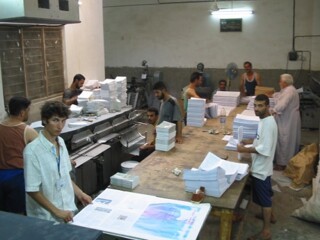On the ‘Baghdad Bulletin’
Kathleen McCaul Moura
'Tomorrow, are you ready to die?' Fadil asked me. He was the chain-smoking owner of the hotel in Jordan I stayed at 13 years ago, soon after the fall of Saddam Hussein. I was 22, had just finished university and was waiting for a ride across the desert to Baghdad, where I would begin working for Iraq's first postwar English language newspaper, the Baghdad Bulletin. I wasn't ready to die and thought I should maybe go home, but gave a watery smile, took a gulp of Fanta and fixed my eyes on the flickering TV, tuned to CNN.
Reaching Baghdad, I was surprised by the mid-morning bustle, shops and markets, strawberry and banana juice at an internet cafe. But it wasn’t long before I heard the jagged sound of gunfights on the street outside the house where the Bulletin staff were staying. A young journalist who had been due to live with us was shot in the back of the head. Reporting became fraught. I remember being pushed back into a car as crowds of young men, shouting, carrying banners, violently angry, gathered around me and Ali, my translator. The UN headquarters went up in a mushroom cloud.
What had seemed a dangerous but exciting job quickly became dark, violent, uncontrollable. The Baghdad Bulletin published seven issues in total, every two weeks, between June and September 2003. The first front cover featured smiling Iraqi children playing in a fountain; one of the last carried a grainy image of a deserted street, silhouettes of a US army patrol. The newspaper closed because advertising from companies investing in postwar Iraq dried up before it started.
Tony Blair, defending his position against Chilcot's judgment that the coalition authority was to blame for the disintegration of Iraq, said that alternative approaches would not have been more successful in stabilising the country because of terrorism. But the ambivalence Ali felt towards the forces which deposed Saddam first turned to anger not because of terrorism, but because his hometown was crumbling around him. My first article was about the rubbish piling up on residential streets. The manager of a garbage depot told me he'd been held up by workers with guns demanding wages, but there was no one to pay them.
Rich neighbourhoods that could afford to pay renegade truck drivers were OK, but the poor were not. Sewage flowed up out of drains; the electricity supply was sporadic. Resentment against the coalition authority grew. They had beaten Saddam easily but could not stop looters or violence on the streets. One day I saw coalition tanks roaring through the city, spinning cars out of their way like tops. Ali continued to work as a translator, under increasingly dangerous circumstances, but other young men chose to fight back.
Ali and I travelled down to the southern cities of Najaf and Karbala, holy centres for Shia Muslims. We found not only an army forming in the name of Islam, made up mostly of men from the poorest parts of society, but also thousands of Iranians who had crossed the border after the fall of Saddam. One of them told me how he liked Americans because they said the Iranians could go where they liked, anywhere in Iraq. Another said there were more buses between from Karbala to the Iranian city of Mehran than to Baghdad. Two women were arrested with 20 kilos of hashish at the Imam Husayn shrine. One of the Bulletin drivers, Salim, found this very funny. He liked to tell people I was his niece visiting from Iran because of my pale face. But uncontrolled borders and foreign influence in Iraq turned out to be key to its downfall.
When the Bulletin closed I left Iraq, after only three months in the country. I went to work for a local paper in Kashmir, then the BBC and al-Jazeera. I've asked myself many times over the years whether I should have ever gone to Iraq. I had no idea what I was getting into. As the Chilcot Report makes clear, I wan’t alone in this.
Unlike me, or the occupying forces, most Iraqis have been unable to leave the violent mess of post-invasion Iraq. By 2009, Chilcot noted, more than 150,000 Iraqi citizens, most of them civilians, had died in the violence.
Read more in the London Review of Books
Philippe Sands: The Chilcot Report · 28 July 2016
James Meek's Iraq War Diary · 28 July 2016
